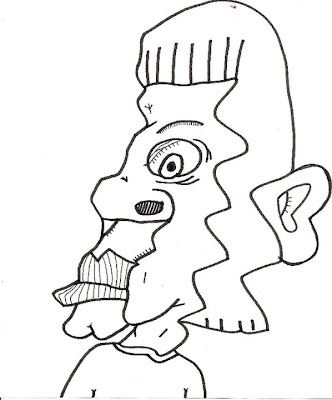From Benjamin Hale’s
“The Last Distinction?: Talking to the Animals” in this month’s
Harper’s:
Proving that an animal could be “taught” to communicate by language—as narrowly conceived by [Noam] Chomsky—became a holy grail for language researchers. Herbert Terrace sought this prize by way of Nim Chimpsky.
There is something glib and thoughtless about bestowing on another conscious being a pun for a name. Glibness and thoughtlessness, as one sees in the documentary [Project Nim], are just a couple of Terrace’s winning traits, and Nim Chimpsky’s name was only the first indignity in a life full of indignity and suffering, which is the main subject of Marsh’s film.
You know, I don’t know. I just don’t know. What separates “bestowing on another conscious being a pun for a name” from “naming your child after yourself or another loved one”? I just don’t see there being all that much of difference between having yourself
generations of Anthonys and what Hale perceives as symptomatic of Terrace’s abusiveness. Is Ramon Jr. different in degree or in kind from Nomar?
My partner,
Jacob, was named after his great-grandfather Israel—and might we not think of wrestling with angels as simply another term for the highest form of wordplay?
Maybe I am sensitive here. As I have described
elsewhere, it was not until the seventh or eighth grade that I came to like my own first and middle names, Hannah Maitland, and this was only because, as I then realized—I was attending a friend’s dance performance at Dance Theater Workshop, this I so clearly remember—“Hannah Maitland” contains the word “animate” and, in full, nearly rhymes with “animation.” How could I dislike a name, I reasoned, that seemed to forecast my lifelong obsession with cartoons?
And does not the fact that she calls them Roc and Roe singlehandedly redeem Mariah Carey’s decision to name her son and daughter Moroccan and Monroe?
I think, too, about a name that, like Noam and Nim—and name—begins with an
n sound and ends in an
m one: Naum. I have
once before discussed it in conjunction with Noam, but I should I clarify that, as far as I can tell, the two names are etymologically distinct. Noam is like Naomi, while Naum, the alternative spelling of Naoum notwithstanding, is not. But I would not look askance at you if, say, you decided to name your son Naum in commemoration of his great-grandfather Noam. Would
that be glib?
I, meanwhile, would choose to name a son Naum for a wholly different, but no less (it would seem) glib, reason: its resemblance to “
zaum”—in English, “transreason,” “transration,” or (my preferred translation, courtesy of Paul Schmidt) “beyonsense.” Working backwards, that would make Naum mean not “comforter” but something like “in mind” or “to[wards] reason” or “in a sense” (“innocence”? “incensed”?).
Ah, show me a monkey capable of such reasoning and I will gladly be his uncle!










